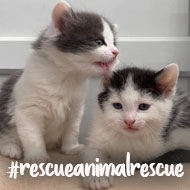Rescue charity campaigns for emergency government support

Boris and Wilfred were born during lockdown at one of NAWT's shelters.
Animal lovers are being urged to write to their local MP in a bid to to support rescue and rehoming centres struggling amid the coronavirus pandemic.
The #RescueAnimalRescue campaign is being led by the National Animal Welfare Trust (NAWT), one of the hundreds of rescue and rehoming centres in the UK facing financial difficulties as a result of the coronavirus lockdown.
“We’ve been hoping the government would support us like it has with zoos and aquariums, but so far nothing has been announced,” commented NAWT CEO Clare Williams. “Like other charities, we rely on raising money from visitors, year-round events and our charity shops, all of which have had to stop during lockdown, meaning a massive drop in income.”
Spearheading the campaign are two kittens named Boris and Wilfred, who were born during lockdown at one of NAWT’s shelters. The charity saved the young brothers after finding their mother straying and living off scraps from bins in a nearby high street.
NAWT fears there will be a spike in unwanted animals once lockdown restrictions are fully lifted, as people’s circumstances at home and at work change.
Clare adds: “We know that the demand for pets has been particularly high. Our centres have been quieter during lockdown but we are fully expecting demand for our services to go up, clashing just at a time when the real impact of the lack of funding will hit.
“It could be a dire situation for animals like Boris and Wilfred because if there are no places for them in rescue, then the responsibility falls to the local authorities. Many of them are already cash-strapped after having to deal with the COVID-crisis. I dread to think what this will mean for unwanted pets in the future.”
NAWT is asking animal lovers to write to their MP urging them to raise the matter with the Chancellor. For more information and to get involved, visit nawt.org.uk/rescue-animal-rescue-contact-your-mp



 The Federation of Independent Veterinary practices (FIVP) has announced a third season of its podcast, Practice Matters.
The Federation of Independent Veterinary practices (FIVP) has announced a third season of its podcast, Practice Matters.